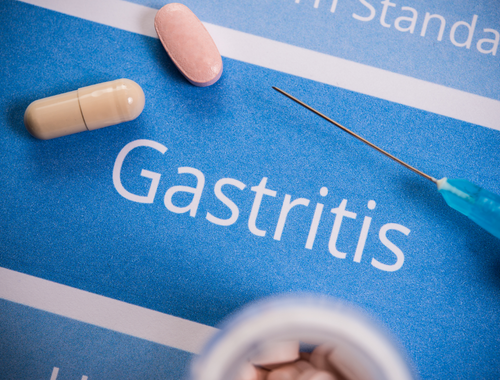Difference Between Gastritis and Ulcer
Gastritis is an inflammation of the inner mucosal layer of the stomach. It can be acute or chronic depending on how long the disease persists. Gastritis can lead to erosion of the stomach wall resulting in gastric ulcers. Sometimes these erosions can occur in the duodenum and are referred to as duodenal ulcers.

What is gastritis?
Definition:
Gastritis is an inflammation of the inner mucosal layer of the stomach. It manifests as dyspepsia, weight loss, regurgitation, stomach pain, nausea, and indigestion.
Causes:
The causes of gastritis and ulcers are more or less the same as peptic ulcer disease is the sequelae of complicated gastritis itself. These include chronic alcohol intake, prolonged use of nonsteroidal anti-inflammatory drugs (NSAIDs), smoking, and infective and autoimmune etiologies. Helicobacter pylori is the most common cause of peptic ulcer disease and gastritis. Less frequent causes of gastritis include bile reflux, trauma, severe burns, and brain injury.
Symptoms of gastritis:
Common symptoms of gastritis include frequent burping, bloating, nausea, vomiting, black tarry stools, indigestion, weight loss, abdominal pain, and hematemesis.
Layers affected:
The mucosal lining is the affected gastric layer in gastritis.
Diagnosis:
H. pylori breath test is done initially to identify suspected gastritis. If bacteria are present, a breath test will pick up the increase in carbon dioxide. Blood tests are requested which detect antibodies for H pylori. A stool antigen test is also important to diagnose gastritis. The definitive investigation is upper endoscopy which confirms the diagnosis.
Treatment:
Proton pump inhibitors such as Omeprazole, and esomeprazole are the mainstay drugs for treating gastritis. These reduce the acid production of the stomach. Histamine (H2) blockers such as Cimetidine as also important to slow down the disease progression. Additionally, antibiotics and antacids may be needed to reduce indigestion and infection.
Complications:
If left untreated, gastritis can lead to life-threatening complications. These include anemia due to excessive blood loss through upper gastrointestinal bleeding and peptic ulcer disease. Vitamin B12 and iron deficiency anemia are common in chronic gastritis. Furthermore, gastritis increases the risk of acquiring gastric cancer.

What is a gastric ulcer?
Definition
Peptic ulcer disease or simply gastric ulcer occurs when the protective lining of the stomach is eroded, and open sores form eventually.
Causes:
Two main causes of gastric ulcers are Helicobacter pylori infection and chronic use of NSAIDs. H. pylori is a bacterium that breaks down the mucosal lining of the stomach and causes ulcers. NSAIDs are used as over-the-counter analgesia. These can damage the mucosa of the stomach and cause ulcer formation. Other causes of gastric ulcers include gastrinomas, steroid intake, and burn injuries.
Symptoms:
The predominant symptom of gastric ulcer includes gnawing, and nocturnal pain in the upper abdomen, which fades away with eating. Other symptoms include bloating, dyspepsia, vomiting, black tarry stools, and weight loss.
Diagnosis:
Endoscopy is the main investigation for diagnosing gastric ulcers. Initial investigations include a urea breath test and stool test for detecting H. pylori.
Treatment:
In actively bleeding ulcers, endoscopy is used to secure the vessels. Medications used for gastric ulcers include proton pump inhibitors, histamine receptor blockers, and antibiotics.
Complications:
Bleeding, perforation, and gastric outlet obstruction are a few of the complications of gastric ulcers.
Difference between gastritis and gastric ulcer
Definition:
Gastritis is an inflammation of the inner mucosal wall of the stomach. Ulcers are open sores in the stomach wall that result from extensive erosion of the stomach wall.
Causes:
Common causes of gastritis include chronic alcohol intake, prolonged use of NSAIDs, autoimmune conditions, and H. Pylori infection. Less frequent causes of gastritis include bile reflux, trauma, severe burns, and brain injury.
Peptic ulcer disease has two main causes: H. pylori and NSAIDs. Very rarely tumors such as gastrinomas and steroids can cause gastric ulcers.
Symptoms:
Common symptoms of gastritis include bloating, nausea, vomiting, indigestion, weight loss, and abdominal pain. Gastric ulcers present with gnawing, and nocturnal pain in the upper abdomen, which fades away with eating, bloating, dyspepsia, vomiting, black tarry stools, and weight loss.
Diagnosis:
Tests needed for diagnosing gastritis include H. pylori breath test, stool antigen, and upper gastrointestinal endoscopy. For gastric ulcers, endoscopy is the most important investigation.
Treatment:
Proton pump inhibitors, histamine receptor blockers, antacids, and antibiotics are used in both conditions. For actively bleeding ulcers, endoscopy is needed to visualize and cauterize the bleeding sites.
Complications:
Complications of gastritis include anemia and peritonitis if the ulcer perforates. Furthermore, gastritis increases the risk of acquiring gastric cancer. Bleeding, perforation, and gastric outlet obstruction are a few of the complications of gastric ulcers.
Table of differences between gastritis and ulcer

FAQs
Can you have gastritis without an ulcer?
Yes. Gastritis is a general inflammation of mucosa of stomach. If left untreated, only then it progresses to ulcer.
How do you treat an ulcer or gastritis?
Proton pump inhibitors, histamine receptor blockers, antacids and antibiotics are used in both conditions. For actively bleeding ulcers, endoscopy is needed to visualize and cauterize the bleeding sites.
Which is more painful gastritis or ulcer?
Intense pain is more common in ulcers than in gastritis.
How do they tell if you have gastritis?
Symptoms of gastritis include frequent burping, bloating, nausea, vomiting, black tarry stools, indigestion, weight loss, abdominal pain, and hematemesis. However, endoscopy is needed for confirming the diagnosis of gastritis.
- Differences Between Reptiles and Amphibians - May 17, 2024
- Difference Between Ophthalmology and Optometry - May 15, 2024
- Difference Between Fear and Anxiety - April 2, 2024
Search DifferenceBetween.net :
Leave a Response
References :
[0]Graham, David Y. "History of Helicobacter pylori, duodenal ulcer, gastric ulcer and gastric cancer." World Journal of Gastroenterology: WJG 20.18 (2014): 5191.
[1]Glickman, Jonathan N., and Donald A. Antonioli. "Gastritis." Gastrointestinal endoscopy clinics of North America 11.4 (2001): 717-740.
[2]Azer, Samy A., and Hossein Akhondi. "Gastritis." (2019).
